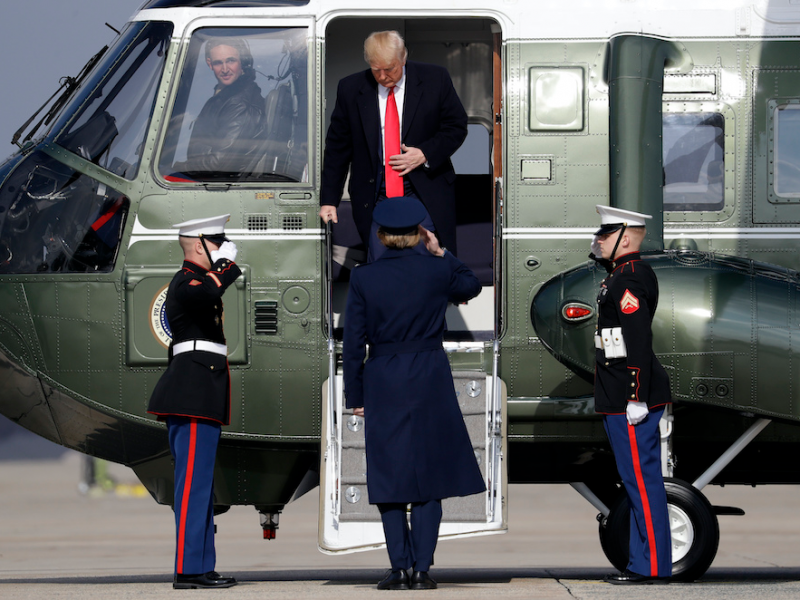- President Donald Trump’s comments like the US military is training “our boys to be killing machines” show the commander in chief is out of touch with the force he leads.
- The business of the US military is ensuring the lawful use of force, and that any service member suspected of violating this or committing any crime is investigated and prosecuted with an opportunity to defend themselves.
- “His instincts are anathema to what the modern American military’s instincts are,” a national security expert told Insider.
- The fastest way for the US military to lose its credibility with the foreign populations it must protect to defeat the enemy is by desecrating dead bodies or letting “killing machines” go unpunished.
- Visit Business Insider’s homepage for more stories.
President Donald Trump, who has butted heads with his national security team again and again, quipped early this year that he would’ve made a “good general.” But mounting evidence suggests otherwise.
“His instincts are anathema to what the modern American military’s instincts are,” constitutional law professor at Cardozo School of Law and national security expert Deborah Pearlstein told Insider.
On Thursday, the president on Twitter ordered the US Navy not to take away a pardoned Navy SEAL’s Trident pin, and added: “Get back to business!“
Trump granted clemency to Navy SEAL Chief Eddie Gallagher, who was convicted by a jury of his peers of posing with a dead fighter’s body; he allegedly texted a photo of himself gripping the corpse’s hair while holding a knife, saying, “Got him with my hunting knife.” Gallagher was found not guilty of the most serious charges: murdering the fighter and trying to shoot civilians with a sniper rifle.
'Killing machines'
Trump has the power to pardon or even dismiss charges, as he recently did in the case of an Army officer accused of murder - itself an extraordinary intervention in the military justice system. In a tweet about this case, Trump said: "We train our boys to be killing machines, then prosecute them when they kill!" It's words like these, or "Get back to business!" that show the commander in chief is out of touch.
The business of the US military, in fact, is ensuring that any service member who is suspected of committing a crime is investigated and prosecuted with an opportunity to defend themselves. Troops who witness crimes are expected to report them. Officers are routinely involved in investigating allegations or ensuring that the accused appear at disciplinary hearings. All of this is a routine part of military life.
This is far from a perfect system, of course, as shown by the fact that only about 11% of sexual assaults reported actually go to court-martial.

Trump says that the US military teaches troops to kill. That, of course, is only part of the story. The US military trains its pilots, ship commanders, armor and infantry to execute the missions they are assigned and to defend themselves and the troops beside them whenever necessary. They are expected to only follow lawful orders.
"What's really unusual, at least in modern history, is pardoning soldiers accused of war crimes," Pearlstein told Insider.
"The kind of crimes that are at issue here, these aren't marginal crimes," she said. 'These are the kinds of crimes that go to the core of what we're talking about when we talk about war crimes."
Indeed, the defense secretary and the army secretary carried detailed case histories and graphics to the White House in a last-ditch effort to dissuade Trump from pardoning the accused war criminals, the Washington Post reported.
The Navy SEALs have a 'problem'
This is why the US military emphasizes its smart bombs and precision strikes in an effort to avoid harming civilians in keeping with the laws of war followed by the US military. It often falls short.
"Part of what the role of the military is when it fights these kinds of wars is to defend the Geneva Convention," Pearlstein said, referring to the agreed-upon international concept of the laws of engagement. The difference between forces who follow the Geneva Convention and those who don't is a key test of who the "good guys" and the "bad guys" are in any given conflict.
In other words, this isn't an episode of "Vikings."
Navy SEAL leaders have borne the brunt of the military's most dangerous missions for nearly two decades. Their leaders are now working to re-instil discipline after the head of the Navy SEALs said, "some of our subordinate formations have failed to maintain good order and discipline ... we have a good order and discipline problem." This is the business of command.
Despite Trump's purported great respect for military leaders, "he doesn't seem to have a great deal of actual respect for professional expertise," Pearlstein said.
As military leaders say again and again, the fastest way for the US military to lose its credibility with the foreign populations it must protect is by desecrating dead bodies or letting "killing machines" go unpunished.
